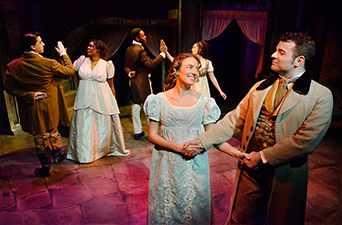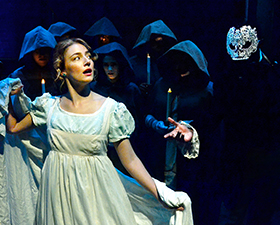From the Chicago Sun-Times
‘Northanger Abbey’ a gemlike new musical on innocence, experience
June 8, 2016
By Hedy Weiss
HIGHLY RECOMMENDED
Broadway spends millions of dollars on the creation of a single new musical that cycles through endless workshops, out-of-town tryouts and massive publicity campaigns. And then, with not a hint of hype, and a budget probably equal to the cost of five Broadway costumes, along comes Lifeline Theatre (the modest, widely admired company that for 33 seasons has devoted itself to literary adaptations and new work), with the world premiere of “Northanger Abbey.”
A sparkling jewel of a musical, inspired by the Jane Austen novel of the same name, it is driven by a ravishing score full of beautiful melodies and the most sophisticated lyrics (the work of George Howe); a meticulously structured book (by Robert Kauzlaric); an ideally talented and notably diverse cast under the flawless direction of Elise Kauzlaric; and superb musicians led by music director Ellen K. Morris. Marked by an abundance of intelligence, emotion, wit and style, it is perfection — a glorious look at the power of art and the complexity of love, at the tension between fantasy and reality, and at the painful transition from innocence to experience.
“Northanger Abbey” is Austen’s earliest novel, and less widely known than “Pride and Prejudice” and “Sense and Sensibility,” but it deals with her abiding obsessions — the search for love and a proper mate, and the pressures and constrictions of social class in 18th century England. It also winningly explores the role novels played in people’s lives at a time when the form itself was taking shape. And it suggests the powerful (even subversive) effect such storytelling had on the imaginations of young women who were curious and hungry for romance and adventure, but had little access to genuine experience.
To be sure, Catherine Morland (a star turn by Stephanie Stockstill, an actress whose luminous charm and grace is complemented by a lovely soprano), lives vicariously through novels, and is particularly obsessed with the popular gothic fiction of the time. One of 10 siblings in a modest family, it is her entry into “society,” by way of Mrs. Allen (Jenifer Tyler, very funny as a starchy, elderly mentor), provides her with a different sort of awakening. On a first-time trip from the countryside to the social whirl of Bath, she bonds with the flirty, impulsive, superficially worldly Isabella Thorpe (Lydia Hiller, ideal as the material girl), who seems to be headed for marriage with Catherine’s beloved brother, James (Chris Ballou, who deftly suggest a fellow who wears his heart on his sleeve). Catherine also meets the dashing, art-loving Henry Tilney (Javier Ferreira), to whom she is instantly attracted, and with whom she shares her passion for novels. Tilney’s family home also just happens to be Northanger Abbey, a gothic convent that is the stuff of her dreams.
Of course a great deal must happen before the couple is united, and it involves the efforts of the smug, laughably self-satisfied John Thorpe (a wonderfully comic turn by Andres Enriquez) to woo Catherine, as well as the complex dynamics of the Tilney family, which includes Henry’s lonely, lovelorn sister, Eleanor (a poignant turn by Shelby Lynn Bias); her other exceptionally polished but nasty brother, Frederick (the handsome, authoritative Denzel Tsopnang), and the siblings’ tyrannical father, General Tilney (the impeccable Peter Greenberg, who can capture a character in the delivery of a single line).
Composer-lyricist Howe has spent most of his career writing children’s musicals, but “Northanger Abbey” showcases a lyricist with the breadth and depth of Stephen Sondheim, a rapturous way with melody, and a gift for penning songs that ideally match the characters who sing them. Each of the show’s nearly 20 songs is a jewel — from the playful “Horrid Little Novel” for Catherine and Isabella, to the gorgeous, soul-bonding “Profoundly Human” sung by Catherine and Henry, to the achingly lovely “The Symmetry of Flowers,” for Eleanor and Catherine. And Catherine’s music-driven carriage rides with each of her suitors (tellingly staged by Kauzlaric) are priceless.
With theaters nationwide on a perpetual hunt for new musicals, “Northanger Abbey” should enjoy a rich extended life. Producers would be well-advised to come to Lifeline to see exactly how the show should be done.
From Newcity
Humble But Exceptional
June 20, 2016
By Danielle Levsky
RECOMMENDED
The world premiere of “Northanger Abbey” at Lifeline Theatre left the audience starstruck with an equally riveting combination of writing, direction and performance. Now on their thirty-third season of presenting new work and literary adaptations, like this piece, based on the novel by Jane Austen, Lifeline’s narrative is humble but exceptional.
Like many of Austen’s novels, this comedy musical centers around a bright-eyed girl, Catherine Moreland (Stephanie Stockstill), who leaves her quiet country home in search of love and adventure in high society-driven Bath. Inspired by literary heroines in her favorite Gothic novels, Catherine realizes that her carefully crafted fantasies cannot compare to reality’s strife and heartache.
The book, written by Robert Kauzlaric, shows an expert take on structure and engagement, including themes of seeing the depth and layer in art. The music and lyrics by George Howe are catchy and memorable, with songs such as “The Little I Know,” “The Symmetry Of Flowers” and “A Mother Would Have Been A Constant Friend” staying fresh in the audience’s mind long after curtain call. Director Elise Kauzlaric makes this absolute gem of a musical transition from scene to scene seamlessly through clever staging and subtle lighting changes.
Stockstill delivers an authentic performance. Though she possesses a stunning voice, she does not overpower her castmates but plays to all of their strengths. Her chemistry is palpable with each character she encounters, from her charming companion Isabella (Lydia Hiller) to her wealthy, hilarious and dynamically-played neighbor Mrs. Allen (Jenifer Tyler) as well as her love interest Henry Tilney (Javier Ferreira).
Ferreira reciprocates Stockstill’s chemistry remarkably. The two play off each other’s subtle facial expressions, adding a deeper sense of humor and honesty to the piece. The audience responds to their sheepish and romantic interactions with heavy sighs (and giggles?), basking in the glow of innocent love.
“Northanger Abbey” brings to life the essence of Austen’s work while maintaining a lighthearted approach in its delivery.
From Windy City Times
June 15, 2016
By K. Sean Mallory
I was carried away on an alluring and fascinating adventure to the High Society world of Bath and the mystery and intrigue of Northanger Abbey in Gloucestershire. Stephanie Stocksill, as Catherine Morland, drew me in and immediately made me feel the innocence and excitement of a young girl discovering the love and heartache of this coming-of-age tale.
The ensemble cast brilliantly captured the essence of Jane Austen in bringing this magical tale to the musical stage. Despite a few barely audible words in a few musical numbers, I was blown away by each of the voices who drew me in leaving me to want more and more—most especially with the magical and hypnotic mood set by the cellist, violinist and pianist.
The connection between Catherine and Javier Ferreira’s dashing Henry Tilney was instantly felt and carried throughout the entire show wonderfully, reminding the audience of the excitement and anticipation of a beautiful young love. Act One’s final scene of Northanger Abbey wonderfully showed the dark and sinister anticipation of Catherine’s vivid imagination of what lay before her. Of particular mention are the muses who help propel Catherine’s imagination throughout the story.
Act Two of Northanger Abbey took the audience on an exploration of both the abbey and its inhabitants, showing the heartache of young love, loss and final lesson of taking control of the direction of one’s own life. Catherine, Henry and his sister Eleanor, played by Shelby Lynn Bias, displayed a beautiful arrangement of “The Symmetry of Flowers,” having tugged at the heart even further by Eleanor’s “A Mother Would Have Been a Constant Friend.” By the end of the show, this lover’s tale has come full circle with the happiest of endings in “Let Me Offer My Hand” after Henry also learned his own life lesson of standing out on his own and taking control of his own chapter.
Director Elise Kauzlaric sets the audience on a magical and delightful journey into the world of Jane Austen, making this an absolute gem in Rogers Park at the Lifeline Theater. Northanger Abbey is indeed a must-see!
From Chicagoland Musical Theatre
Lifeline’s ‘Abbey’ offers a Jane Austen musical that makes good sense
June 8, 2016
By Barry Reszel
The reason Chicago is the favored launching pad for Jane Austin novels-turned-musical theatre is unclear.
It’s also undeniable.
Like last summer’s Sense and Sensibility at Chicago Shakespeare, Lifeline Theatre’s current musical production of Austen’s very first novel, Northanger Abbey, is making its world premiere here. But unlike the book and music this writer found sensibly staid in last summer’s regal production on Navy Pier featuring Broadway star Megan McGinnis, Lifeline’s Abbey is wrapped in quick wit with a delightful songbook that turn this Georgian-set English novel into must-see musical theatre.
There’s no doubt fans of Austen’s writing and period pieces are the baked-in audience for this staged literature. And of course they will revel in this (or any) first-class production. But to turn a dialogue-heavy novel (Abbey‘s audio version clocks in at a tad more than eight hours) into a successful, digestible musical puts a huge onus on the book and songbook. Robert Kauzlaric‘s quickly-paced dialogue and George Howe‘s interesting and varied music and lyrics provide Director Elise Kauzlaric enough emotional peaks and valleys to move the action forward at a wonderfully proper theatre-viewing pace.
Northanger Abbey, Austin’s semi-autobiographical story and parody of Gothic novels, sees Catherine Morland leave her quiet country home for the splendors of Bath. Armed only with an innocent heart and the examples of her favorite literary heroines, she is immersed into a new world of parties, balls and high society. Catherine soon finds herself caught in a web of social scheming far above her skill to master. False friends, greedy lovers and a wealth of misunderstandings lead to the revelation that bruises of the heart can be far more painful than the imagined terrors of Gothic novels.
Bringing the tale to life is an exquisite, professional ensemble led by a triumvirate of angel-voiced actresses: Stephanie Stockstill as protagonist Catherine, Lydia Hiller as the shallow Isabella Thorpe and Shelby Lynn Bias as Eleanor Tilney. The ladies are well complemented by the convincing Javier Ferriera as Catherine’s beau, Henry Tilney; Chris Ballou as her brother, James; the hilarious Andres Enriquez as clueless John Thorpe; and the sternly uncompromising General Tilney, played by Peter Greenberg. Indeed this list is a who’s who of actors destined for long careers on Chicagoland stages.
Vocal highlights in a splendid songbook that serves as glue to the plot’s progression include the first act’s “Sweet, Indelicate Complexities,” “The Little I Know” and “Profoundly Human,” along with Act 2’s “The Symmetry of Flowers” and “A Mother Would Have Been a Constant Friend.” So, too, does the invention of a Greek chorus permit a delightful connection between the Gothic novels Catherine reads and her real-life action as it unfolds. Kudos to Robert Kauzlaric for this approach.
Also deserving not just mention, but strong Jeff consideration, is the intimately wonderful set created Sarah Lewis. She transforms the relatively small Lifeline stage into an interestingly geometric labyrinth of archways, levels and entrance points that immensely enhances the show’s overall visual interest. If there’s a nit, it’s that Costume Designer Aly Renee Amidei needed a bigger budget to afford more costume changes, or at least accessorizing.
In short, there is every reason to see this literary classic-turned-musical. Jane Austen would be well pleased, indeed.
From Time Out Chicago
Jane Austen’s novel comes to musical life in Lifeline’s new stage adaptation
June 22, 2016
By Jamie Mermels
4 out of 5 stars
In Lifeline’s delightful new musical adaptation of the Jane Austen novel, Catherine Morland (Stephanie Stockstill), the daughter of a poor clergyman, has spent her life with her nose in a book, awaiting her own adventure. When a wealthy neighbor (Jenifer Tyler) takes her to the affluent enclave of Bath to meet an appropriate suitor, a whirlwind romance ensues.
The play’s whimsy and charm are largely contingent on Catherine. As her fantasies and realities intertwine on set, we’re anchored by Stockstill’s splendid performance. Her beautiful soprano shines throughout the entire score, and she makes Catherine’s charming naiveté bewitching. The rest of the cast is uniformly excellent; in both chorus and featured roles, each member of the ensemble shines.
Director Elise Kauzlaric and set designer Sarah Lewis have done wonders with Lifeline’s compact space. A sense of scale has been acutely achieved, so it feels as if Catherine and her suitor, Henry Tilney (Javier Ferreira), are romancing through crowded lavish ballrooms and an expansive abbey.
The show borders on parody, to the point where sincere moments of theatrical staging, such as flowers descending from the sky to represent the entrance to a garden, incite laughter. The self-awareness of the theatrical mode is entertaining, but detracts from the otherwise earnest nature of the show. Kauzlaric and her design team have constructed such a tight and precise world that referencing the failings of it only undermines their accomplishment.
Overall, though, the production itself is top notch. This superior production is nothing short of enchanting and is sure to delight Austen fans and musical theater lovers alike.
From Chicago Stage Standard
“Northanger Abbey” Dances and Delights at Lifeline Theatre
June 7, 2016
By Melissa Wiley
3.5 out of 4 stars
A lot can happen when a girl leaves home. In the world of Jane Austen, she usually goes to Bath, stays up late, and falls in love. Then things get complicated. The fallout from her affections typically makes for more fun for the audience, however, than the heroine. Only Catherine Morland is the exception. A voracious reader of gothic novels, she tells the audience she awaits the right adventure to transform her into a heroine worthy of an author’s notice.
As she soliloquizes on her love for ghosts haunting ancient abbey corridors, those of us seated in the audience can’t help but giggle, if only because we’ve likely found ourselves taking similar pleasure in a sense of danger but have long since outgrown its attractions. Taking aim at a genre straddling silliness and horror particularly popular in her time, Northanger Abbey is both Austen’s most satirical novel as well as her best defense of her own genius. Slyly juxtaposing her subtle studies in psychology with more sensationalist fare, she implicitly asserts the value of her own art over the titillating drama that continues to dominate entertainment culture.
Here too Austen is perhaps most conscious—and critical of—her own impulse for wish fulfillment as a writer. She, granted, does give Catherine the husband she herself never had. She ultimately accedes to both societal and literary convention, but first she forces Catherine to give up her passion for the macabre, to sacrifice it for the love of a man whose goodness inheres in his own lack of danger and excitement.
Yet before Catherine leaves fantasy behind for something arguably better, she periodically reads scenes aloud from a much juicier drama than the one we’re watching. We know she’s left her girlhood behind only when she closes her book—with a percussive echo from the musicians seated above her on the balcony—for good. Panning literature within literature is a bold move, Jane, one even meta-fictive post-modernists have a hard time pulling off. It’s also one demonstrating just how confidant Austen was in her own artistry, in work whose integrity we still validate through our own rereading and occasional need to put her plots to music.
Like the best musicals, George Howe’s score also assists rather than slows the pacing while reinforcing the delicious irony at work here. On a personal note, I went to Lifeline Theatre last Sunday afternoon, when the weather was at its most halcyon—a word Catherine herself would use freely, likely contrasting it with “the stygian night to follow”—and stepping inside a darkened theater felt a little painful. Seated a few minutes before the musicians began playing, I privately felt this was a prodigal waste of sunshine. Two and a half hours with intermission seemed a little long before the production even started. Only it wasn’t. I left realizing it had been much too long since I’d heard live piano.
Although I was initially concerned there would be too much singing for my liking, I soon found myself toe tapping. Even if you’re not sold on empire dresses and drawing-room banter, then at least come to see some of Chicago’s most glittering young actors. They won’t make you cry, but you will laugh and more than you might think. One of the main reasons for Austen’s longevity is that she is—still—so funny. If you can put any of her sparkling persiflage to use at your next party, so much the better. Here the wittier lines may be sung, but that only means they rhyme, making them that much easier to commit to memory.
Playing Catherine, Stephanie Stockstill has a winning voice, as her role demands of her. To my mind, though, she has an even a keener comic sensibility paired with emotional sensitivity Austen herself would have enjoyed in her flightiest heroine. The real reason you—and Henry Tilney (Javier Ferreira), her amiable admirer—like her is because she falls so far short of the heroines with whom she’s familiar. She giggles and nearly twitches with excitement when asked to dance. She’s not dignified, but she is a riot. She herself is also well aware of paling somewhat in comparison to her friend Isabella (Lydia Hiller), whose sultrier charms seem to inspire more passion among suitors including Catherine’s brother, James (Chris Ballou), one of the play’s lightest touches and jauntiest dancers.
Skilled as are all this play’s actors, the costume designers also deserve credit for underscoring their wearers’ true colors. Isabella’s dress, for instance, features a deep purple low bodice while Catherine’s sits much higher. A delicate shade of blue overlaid with pale lace, her frock highlights her innocence. Similarly, Henry’s brown and tan ensemble befits his role as a trustworthy parson while the flashier suitors in the room wear brasher colors. The set meanwhile looks as solidly gothic—with flying buttresses and gray gothic arches—as you can expect a two-story brick building in Rogers Park to manage. A simple chandelier is raised or lowered at a nod from director Elise Kauzlaric to signal whether we’re in a ballroom or have relocated somewhere more domestic. Likewise, a few branches glued with cherry blossoms fall from the ceiling when Henry and his sister, Eleanor (Shelby Lynn Bias), escort Catherine to their garden.
And there inside its bucolic walls, as close to nature as you can get inside a room with no windows, Henry trains Catherine’s eyes, now freed from the glaze of lurid novels, on the sky and flowers afresh. He also coaxes her to appreciate art that enhances rather than overshadows the beauty of everyday life. Perhaps because he coaxes her in song, I remembered his words once I left the theatre and returned to a day even lovelier than when I left it.
From the Chicago Tribune
A musical ‘Northanger Abbey’ captures Austen’s charm
June 10, 2016
By Chris Jones
3 out of 4 stars
At the age of 17, Jane Austen’s Catherine Morland is “in training for a heroine,” seeing her life through the lens of the very kinds of Gothic novels that were in vogue around the dawn of the 18th century, which is when Austen created one of her most contemporary and likable stars. I remember reading “Northanger Abbey” in college and thinking it was a lousy title for a work so savvy about what it feels like to be a teenage girl with hopes and dreams, especially in a transactional era when it was almost impossible to wrestle any kind of control over your romantic fate.
Especially if you were, like Catherine Morland, one of the 10 children of a poor clergyman. Even in 1798, the rich had it better. Cash money could attract and repel.
“Northanger Abbey,” a reference to the wealthy home in which Catherine finds herself a guest, was not even Austen’s own title.
Although it was the first of her novels to be completed, it was published and titled posthumously. And it is not, of course, anywhere near as famous as “Sense and Sensibility” or “Pride and Prejudice.” But it is old enough to be in the public domain, thank heavens, which explains why Lifeline Theatre premiered a new musical version of the novel, featuring a book by the Lifeline regular Robert Kauzlaric and music and lyrics by George Howe, a composer whose previous endeavors include “Arnie the Doughnut,” a show I remember with enormous affection.
For many years, Lifeline has theatricalized classic novels. Sometimes, this long-lived company has found the inherent theatricality therein. At other moments, you have left wondering why you did not just stay home and read the book. But this one is something quite different — a full-blown musical.
It’s staged on a smaller scale than the recent production of “Sense and Sensibility” at Chicago Shakespeare Theater, but it is every bit as interesting and, compositionally, every bit as good. Both of them have reminded me of how much I love Austen, and how well her heroines and their romantic adventures translate to the stage, and into song.
Stephanie Stockstill, the very charming star of “Northanger Abbey,” is a big talent — she was equally as impressive as Tilly in Sarah Ruhl’s “Melancholy Play” at Piven Theatre. She captures that Austen sweet spot — vulnerable, as with most young women of the 18th century sans a fortune, but also demonstrably aware that only Catherine Morland really was willing and capable of helping Catherine Morland. She understands her character lives both her dreams and her realities, even as she carefully writes her own story to her own specifications.
And good for her, you think throughout, as suitors come and go and best friends make questionable choices in and around Bath, England, a city, as the show often notes, “made for pleasure.”
For some.
There are moments within Elise Kauzlaric’s nonunion production that feel too broadly played, just as there other sections where it lacks confidence and the stakes do not rise as fully as they should. And it is not easy to fit a multiscene musical on this pocket stage; it feels like a workshop staging in places, but one with promise.
For there are several strong performances in a uniformly decent cast — including Lydia Hiller as Isabella, Chris Ballou as Catherine’s brother, James, Javier Ferreira as Henry Tilney and Denzel Tsopnang, as Frederick, one of the more dashing males in this orbit. If you are an Austen fan, or have one around you, there is a great deal here to enjoy.
Howe’s score, created for piano, violin and cello, is quite a lovely song-suite, capturing the “Sweet, Indelicate Complexities” of the Austen world, wherein, as Stockstill’s moving Catherine sings, “a mother would have been a constant friend.”
That particular song got me where I live.
From Chicagocritic
Jane Austen is Alive and Thriving in Roger’s Park
June 8, 2016
By Beverly Friend, PHD
HIGHLY RECOMMENDED
“I’d rather be reading Jane Austen,” my bumper sticker proclaims. Now, after seeing the opening night of Lifeline’s brilliant world premiere musical adaptation of Northanger Abbey, I need a matching sticker: “I’d rather be seeing Jane Austen.”
A master of the “show don’t tell” school of writers, Austen is a perfect novelist for adapter Robert Kauzlaric as, right from the opening scene, he dramatizes the heroine’s thoughts as well as her actions.
We are in a gloomy, high-ceilinged room with arched windows which reveal flashes of lightning to accompany crashing thunder. A gossamer-clad damsel, surrounded by mysterious masked figures and clutching a book, is obviously in distress. Are we in the right play? This is not a Gothic novel — it is supposed to be the antithesis — shining daylight on this dark genre so often filled with unlikely plot twists, overly dramatic emotions and terrifying supernatural elements.
Our maiden — novel-lover Catherine Moorland, (Stephanie Stockstill) — is immersed in the written word until interrupted by her mother’s voice. She slams the book shut, the masked figures vanish, and the Gothic world gives way to ordinary, everyday life.
This clever technique — moving between the fantastic and the mundane — is effectively repeated each time highly imaginative Catherine opens a book, calling forth masked figures reminiscent of a Greek Chorus. Each time she closes the book, we return to the actual world around her.
Catherine, a naive, romantic 17-year old, is in “training for a heroine.” Opportunity arises when she leaves her country home to accompany Mrs. Allen (Jenifer Tyler), a wealthy neighbor, to the city of Bath — a popular English resort providing an equivalent of today’s singles’ scene where couples met ostensibly to taste the restorative waters but actually to find mates via the pleasures of ballroom and theater.
There, she meets two important brother and sister pairs: beautiful and selfish Isabella Thorpe (Lydia Hiller) and her vain, feckless brother John (Andres Enriquez), and — in contrast — charming Henry Tinsley (Javier Ferreira) and his sweet sister Eleanor (Shelby Lynn Bias). Clue as to the outcome: in addition to being a braggart and a bore, John is a non-reader while Henry is familiar with the Isabelle’s favorite novels. In addition, there is also just the right chemistry.
Two other important siblings add to the mix: Catherine’s brother, honest and true James Moorland (Chris Ballou) who loves Isabel and Henry’s sexy, smarmy brother Frederik Tinsley (Denzel Tsopnang) who becomes his rival.
Bath is only Catherine’s first adventure, taking up Act I and setting the scene for what ensues. The Second act heightens plot and suspense when Catherine accompanies the Tinsley family, including General Tinsley (Peter Greenberg), their harsh, mysterious father, back to the family home — a genuine Abbey!
From her vast reading, Catherine expects the Abbey to be frightening and exotic. Indeed, it does turn out to include a mysterious suite of forbidden rooms — where Mrs. Tinsley had died nine years earlier. While she fails to find what she expected, Catherine matures to discover something far more important — herself — a real heroine, as she learns from her mistakes (and that things are not always what they seem), leaves fiction and enters reality.
High praise to adapter Kauzlaric both for what he adds and for what he cuts from the novel as he tightens the story for dramatic effect. Nothing essential is lost from the original. George Howe is also to be praised for what he adds in music and lyrics. Eleven songs are interspersed in the first act and nine in the second — each smoothly weaving into the story, and sung by the strong voices of the fine cast. In “A woman’s reputation,” Mrs. Allen directs Catherine in the proper comportment of a lady. Another delightful moment is when Isabella, John, Henry and Eleanor join voices for “A Carriage Ride to Bristol,” where a reluctant Catherine is carried off by John when she was supposed to be out walking with the Tinsleys. Kudos also to choreographer Todd Rhodes especially for the dance in a musical number aptly titled “Torment” for the sensuality depicted in the love triangle as Isabella is torn between Frederik and James while Catherine looks on helplessly.”
From the Chicago Reader
June 6, 2016
By Albert Williams
RECOMMENDED
This musical stage version of Jane Austen’s first novel (which was written circa 1798 but not published till after her death in 1817) is an engaging piece of theatrical storytelling, with a captivating lead performance by soprano Stephanie Stockstill. She plays Catherine, the naive teenage daughter of a country parson. Invited to the spooky ancient abbey home of a young clergyman she’s falling in love with, she dreams of becoming the heroine of a romantic thriller like the Gothic novels she adores reading—but instead awakens to the more mysterious complexities of real life. Playwright Robert Kauzlaric and songwriter George Howe effectively convey Austen’s wry humor and observant insights into human behavior (though the first act could use some pruning), and Howe’s appropriately Mozartean score is played impeccably by a classical piano trio.
From The Fourth Walsh
June 6, 2016
By Katy Walsh
This. Show. Is. Excellent! The dynamic husband and wife team of Rob (book) and Elise (director) Kauzlaric resurrect Jane Austen’s novel about a girl infatuated with gothic romances. The young bookworm finds herself plucked from her country home obscurity and dropped into sophisticated high society. She experiences her new life with an innocent heart, active imagination and literary ghosts. The script is smart. The wit is pristine. The ensemble is solid. It could have been another wonderful Lifeline 18th century play. Instead, it’s an outstanding Lifeline 18th century musical.
Composer George Howe (music and lyrics) joins the Kauzlarics in creating a spirited, clever adaptation. Howe’s songs fit so perfectly they sound like an extension of the dialogue. Jenifer Tyler (Mrs. Allen) transitions from lecturing to singing as she hilariously nit-picks Stephanie Stockstill (Catherine) in A Woman’s Reputation. Throughout the show whenever Stockstill is alone with her thoughts, the voices in her head are the harmonious chorus. They influence Stockstill by conjuring up wild notions in melodramatic style. One of my favorite songs is Torment, where the cunning Lydia Hiller (Isabelle) flirts with both the noble Chris Ballou (James) and the lecherous Denzel Tsopnang (Frederick). The song, accompanied with choreography by Todd Rhoades, changes back and forth from sweet to steamy as Hiller’s dance partner changes. It’s sexy and funny. I also loved The Symmetry of Flowers, The Story Has Been Written and Let Me Offer My Hand. Each song has a distinct melody and message. I found myself humming them in my head during and after the show. (I want to download these tunes).
The talented ensemble transform into these elegant aristocrats that sing and say the most deliciously wrong things. Tyler’s timing is comedic perfection as she lifts an eyebrow or sails through the ballroom to greet the elite. Her snobby buffoonery brilliantly contrasts with our heroine-in-training, the irresistible Stockstill. The wide-eyed Stockstill radiates an infectious excitement for a book, a man or dead nuns. When she meets the dashing Javier Ferreira (Henry), her apparent pleasure is completely adorable. She is the epitome of a young romantic. She reminded me of Keira Knightly.
NORTHANGER ABBEY is tight. I absolutely loved every aspect. The design team, Sarah Lewis (scenic) and Diane D. Fairchild (lighting), create a harsh, gothic framework. Costume Designer Aly Renee Amidei fills their space with exquisite finery. The aesthetic transports us into the pages of an Austen novel. The writing, the directing, the music, the acting make us want to stay indefinitely. This summer, get swept away with this exceptional new musical.






























